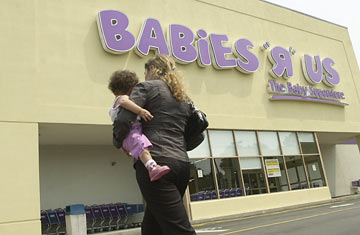
A woman carrying a child walks toward a Babies "R" Us store in North Brunswick, N.J.
(2 of 2)
According to the opinion, an executive from BabyAge, an Internet retailer, testified that "Peg Perego's sales representative admitted that Babies 'R' Us threatened to charge Peg Perego for each new sale that BabyAge made unless Peg Perego made BabyAge stop discounting." In spring 2002, Babies "R" Us was unhappy that Internet retailers were discounting Medela breast pumps. So "to send a message," according to the opinion, Babies "R" Us canceled all Medela orders on May 2, 2002. Backed into a corner, Medela terminated 17 Internet accounts two months later. The reason, according to an internal Medela document: "We discontinued Internet sellers to protect BRU's business and margin, and therefore accepted considerable legal risk."
Tough Tactics, but Still Legal?
That risk, however, became somewhat less considerable two years ago. In 2007 the Supreme Court overturned a nearly century-old ruling that used to make these types of pricing deals inherently illegal. Now such practices must be evaluated under "the rule of reason." For the plaintiffs to win, anticompetitive effects of the minimum-pricing agreement between the manufacturer and retailer must outweigh the pro-competitive effects. That's not an easy case to make. If a manufacturer's sales increased as a result of its deal with Babies "R" Us, the company can argue that it will produce a better product because of increased profits. Thus, the consumer ultimately benefits. Babies "R" Us can argue that its higher sales can pay for in-store services — i.e., stroller demonstrations, gift registries — that would not otherwise be possible absent the minimum-pricing agreements with its Internet competitors. Again, the consumer would benefit.
But in the class-certification hearing, an economist provided a regression analysis showing that the overall sales of the manufacturers actually decreased because of the agreements. Britax, for example, admitted that sales fell 5% in the two months after Internet discounting was prohibited. As for Babies "R" Us' argument that preventing competitor discounts allowed it to increase sales and thus fund services valued by consumers, Brody's opinion notes that the plaintiffs "offered evidence that manufacturers had to pay for many services directly. Each manufacturer paid fees reimbursing BRU for advertisements and promotions." Further, the opinion notes that the defense's expert economist "indicated that BRU would maintain gift registries irrespective of resale price maintenance." In other words, Babies "R" Us wasn't responsible for pro-competitive benefits reaped from price deals. The judge's conclusion: "The defendants' argument may be rejected once again."
Babies "R" Us and Peg Perego declined to comment on the case. Maclaren offered a statement that it "strongly denies the allegations and shall continue to vigorously defend this action." The attorneys for Britax, Medela and BabyBjörn did not return requests for comment. Barring a settlement, plaintiff lawyer Fegan expects the case to go to trial in 2010. "These cases are very hard to win," says Lino Graglia, an antitrust expert who teaches at the University of Texas School of Law. "But if this is an instance of a powerful retailer trying to protect itself instead of trying to provide a service to the consumer, it has to be seen as a potential winner." So all you moms who splurged on that $300 breast pump a few years ago: start looking for the receipt.
